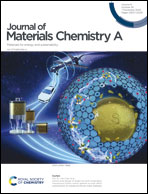Branched conjugated polymers for fast capacitive storage of sodium ions†
Abstract
Redox-active conjugated polymers have drawn much attention as electrodes for batteries. Among them, branched conjugated polymers (BCPs) are supposed to have advantages over linear conjugated polymers (LCPs), because the branched structure should benefit electrolyte infiltration and ionic transport and thus would contribute to high rate capability. However, the direct comparison of BCPs with LCPs as electrodes for batteries is rarely reported because it is difficult to synthesize an LCP and a BCP with a similar chemical environment. Herein, we design and synthesize two aza-fused conjugated polymers as anodes for sodium-ion batteries (SIBs), including an LCP and a BCP with similar constructing units. Both of them displayed outstanding Na-storage performance at a slow rate. Particularly, the BCP anode exhibited extraordinary rate capability, which was much higher than that of the LCP anode. The rate performance of the BCP anode even outperformed most organic polymeric anodes for SIBs. This work provides insight into branched conjugated polymers and inspires the molecular design of novel polymers for SIBs.



 Please wait while we load your content...
Please wait while we load your content...